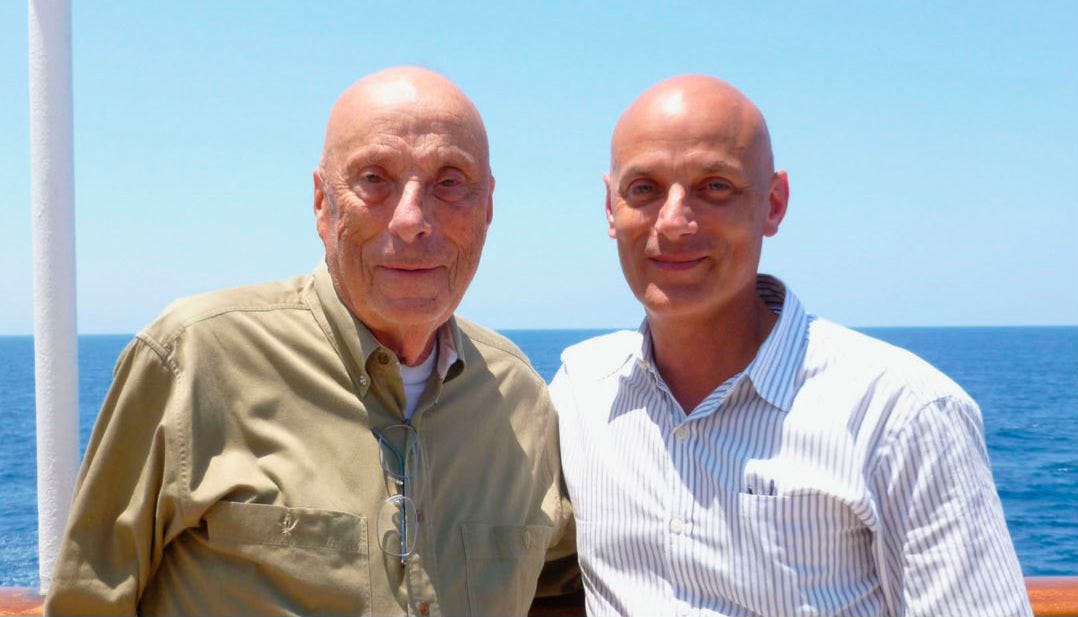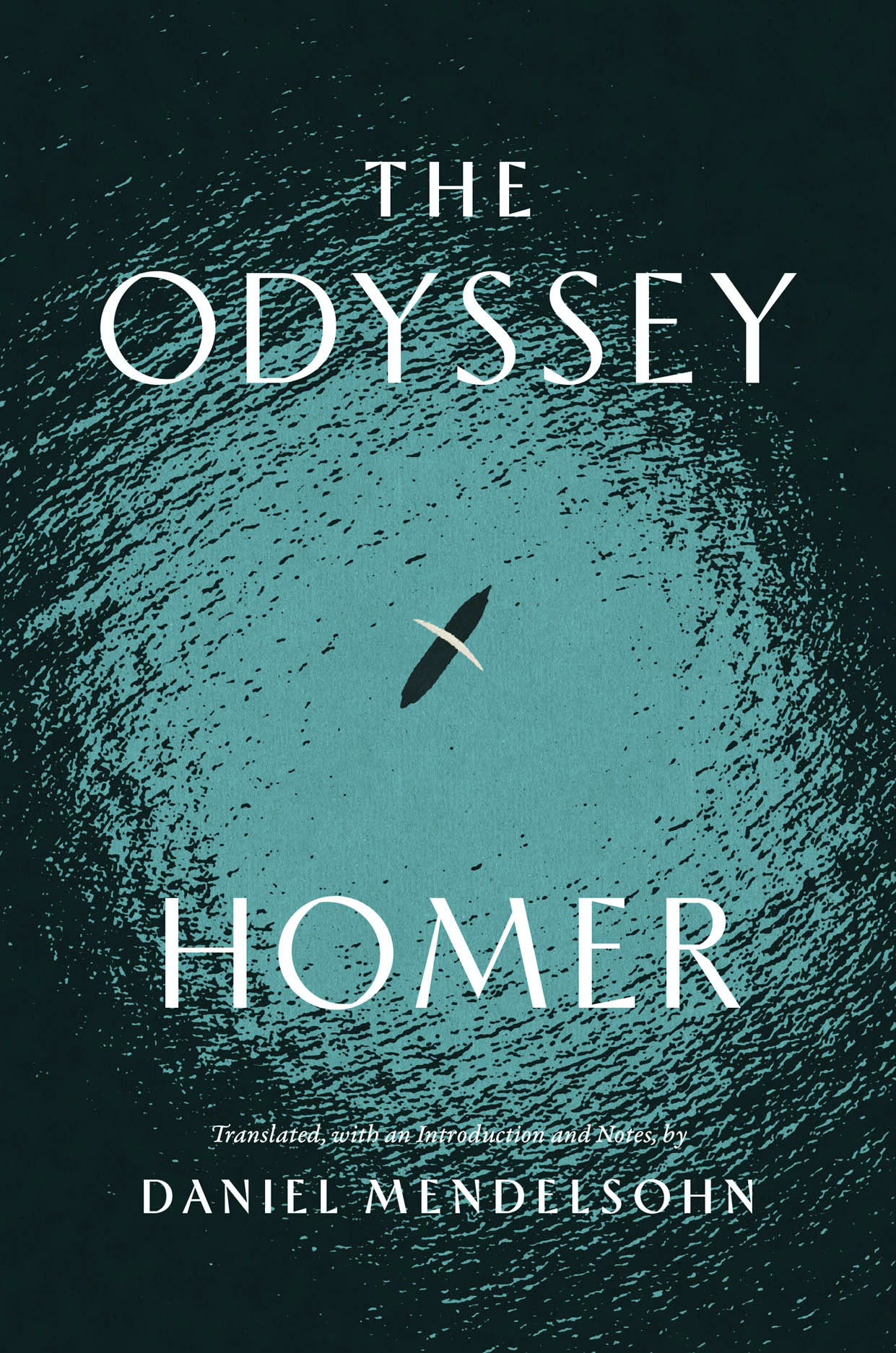If either of my kids were motivated to write a memoir about me, I would have to wish them best of luck. My life has been comfortable and pleasant, my relations with them warm and steady. Truth be told, no major tragedy, conflict, drama, or proximity to history-in-the-making has yet marked my existence. It would take a James Joyce or Virginia Woolf to get inside my head and render my musings and subconscious interesting to a public that doesn’t know me personally.
This thought came to my mind as I read Classics professor Daniel Mendelsohn’s 2017 book, “An Odyssey: A Father, A Son, and an Epic,” which is partly about his late father, Jay. As far as subjects go, Jay is a mildly interesting person who had a mildly interesting relationship with his son. While Daniel is a decent writer, he is no Philip Roth, whose “Patrimony” is a magnificent portrait of his father, a crusty, retired insurance agent at the end of his life. What redeems Mendelsohn’s memoir of his father is the author’s decision to harness it to an exploration of Homer.
In 2011, Jay, aged 81, gets Daniel’s permission to take his freshman seminar devoted to “The Odyssey” at Bard College. After the class is over, father and son take an “In the Footsteps of Odysseus” cruise together in the Aegean, Tyrrhenian, and Adriatic seas. Jay passes away the following year.
By pairing a discussion of “The Odyssey” with a profile of his father, Mendelsohn edifies Daddy as a subject matter while conveying some of what is universal in a 2,700-year-old poem about a warrior-king who outsmarts sea-monsters and witches on a long journey home from the battlefront. The premise has its clunky moments but works well overall. As a bonus, the book provides a worthy initiation to Homer’s classic. (It also gets extra points from me for calling Jay “Daddy,” since my father was a Daddy too, never a Dad.)
Jay was born in 1929 to a humble Jewish family in the Bronx. Something of an auto-didact, he became a mathematician who spent most of his career at Grumman, an aerospace company, and then taught a bit at Hofstra University. He and his wife settled in suburban Long Island and raised their five kids there, including Daniel.
Ho-hum. To be sure, Jay had quirks and strong opinions. But he was no outsized personality, historical figure, war hero, horrid father, swindler, or someone whose last days on earth were particularly dramatic or devastating. In short, he was not fodder for a memoir that writes itself. Jay did not even throw a fit when Daniel came out as gay. He was cool with that. Into middle age, Daniel’s relationship with his father remained cordial but reserved.
At the start of Homer’s poem, Telemachus has grown into manhood during the long absence of Odysseus. Telemachus sets out on a journey and meets people who tell him all kinds of stories about his legendary father. At the poem’s conclusion, Odysseus returns to Ithaca and is reunited with his son. The lives of Mendelsohn père et fils follow a similar arc, moving from decades of emotional distance to a period of gradual rediscovery that begins in the college classroom.
Homer’s work is famously about the values that the main characters in “The Odyssey” live by: loyalty, perseverance, constancy, and hospitality. Jay Mendelsohn also set much store in the values he cherished, especially discipline and authenticity. Daniel links this to his father’s career as a mathematician:
Many of my father’s pronouncements took this x is x form, always with the implication that to think otherwise, to admit that x could be anything other than x, was to abandon the strict codes that governed his thinking and held the world in place: Excellence is excellence, period; or Smart is smart, there’s no such thing as being a “bad test taker.”
Jay was a loyal, if not physically affectionate, husband and father. Daniel felt he had disappointed his father by preferring the humanities to hard science, but later earned his respect by entering the rigorous discipline of Classical studies.
Jay’s ethical code was the product of more than just his mathematical mind. Disappointments evidently reinforced it. He passed up a golden professional opportunity to enter an officer’s course at West Point. He never got a doctorate degree because, as a lifelong friend of his father explains to Daniel, Jay was afraid of failing. In my experience, personal regrets and disappointments can lead people to harden their value systems, as in “I may not have achieved X but I am proud to live my life according to Y.” Such self-imposed rigor can also lead a person to judge others harshly.
In class, Jay flags Odysseus’s shortcomings: the king of Ithaca failed to protect his men from drowning at sea; he cheated on his wife with Circe and Calypso; he cries too often; and — what self-made Jay finds especially objectionable — he gets by thanks to constant assists from the gods. “He’s no hero!” Jay exclaims.
Another theme of Homer’s work is Odysseus’ talent for adaptation while in foreign lands, his knack for dissembling and ingratiating when called for. In their time together, Daniel discovers traits in his father he had not previously appreciated. While Jay’s gruff interventions in class feel familiar, he surprises Daniel during a discussion of the long-awaited reunion between Odysseus and Penelope, no longer a young beauty. Jay, married at that point for nearly six decades, raises his hand to evoke the little things that bind a couple. Then, jerking his head in Daniel’s direction, Jay says, “Anyway, trust me, his mother was beautiful.” Mendelsohn writes, “Jay then shrank back into his chair….With this fleeting display of tenderness, before an audience of children too young to understand what they were witnessing, he had, for a moment, been transformed.”
Daniel wonders what his freshman students make of his father as a classmate, with his “evident disdain” for Daniel’s teaching of the text. He is touched to learn later that several of them had enjoyed long conversations with Jay as they shared a train ride after class from campus to New York City.
That summer, on the cruise, Daniel marvels at how his father seemed so much “softer,” delighting other passengers at cocktail hour with his stories and renditions of show tunes:
Maybe Daddy, too, was polytropos; maybe, as that adjective suggests so powerfully in the Odyssey, identity is less a matter of binary oppositions, the contemptuous or the kindly, the father or the husband, the father or the son, than it is of kaleidoscopic perspective. Maybe it’s a question of which section of the circle, the loop, you happen to be in a position to see.
James Joyce drew on “The Odyssey” to structure “Ulysses” (the Latin name for Odysseus). The protagonist is not a warrior-king but a humble Jewish newspaper ad salesman named Leopold Bloom, whose wanderings span no wider than the Dublin city limits and last no longer than a single day. The day ends with Bloom under the same roof as his wife for the first time since breakfast some 600 pages earlier. But where Homer conveys the personalities and values of his characters mainly through describing their conduct, Joyce’s Ulysses is as much a journey into their interior landscapes.
Mendelsohn deploys Homer to structure his portrait of another everyman: his own father (no disrespect intended). He writes that while “The Odyssey” is about a ten-year interval in the hero’s life, “it is in fact a biography, stealthily encompassing the whole of its hero’s existence by means of narrative and chronological acrobatics.” Mendelsohn does the same thing for his father: writing ostensibly about the year Daddy enrolled in his freshman course, he builds out a fuller appreciation of a life well-lived.







Bravo, Ricky. Seems at least partially autobiographical itself - or do I misinterpret?